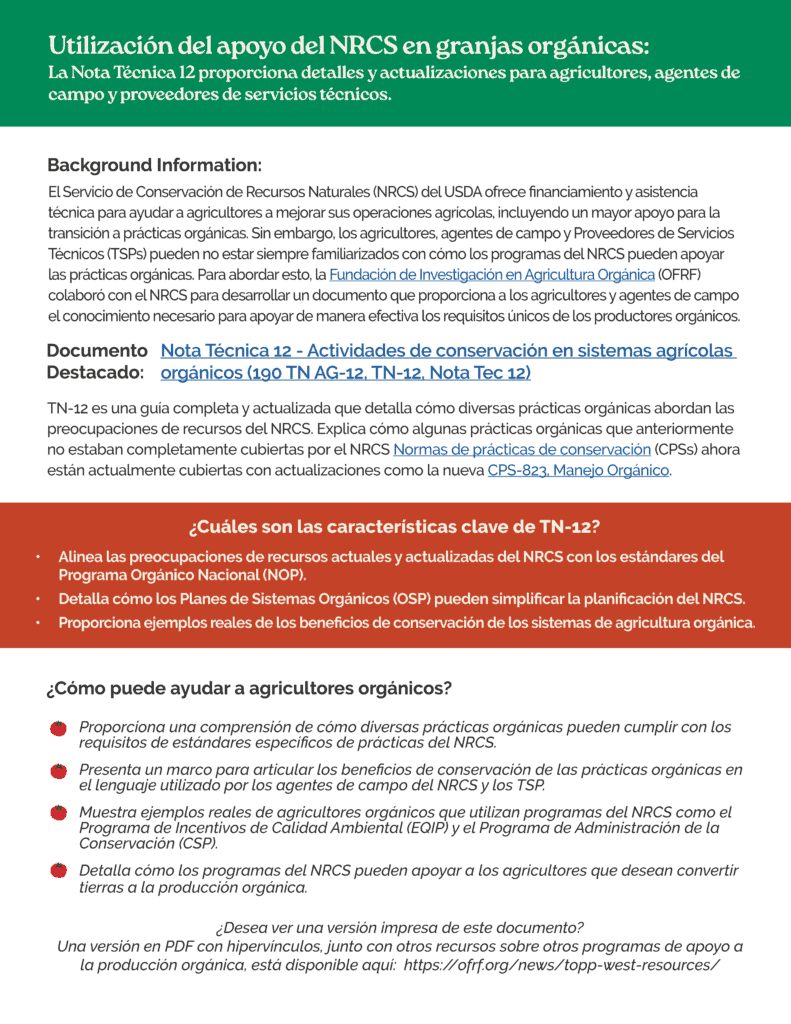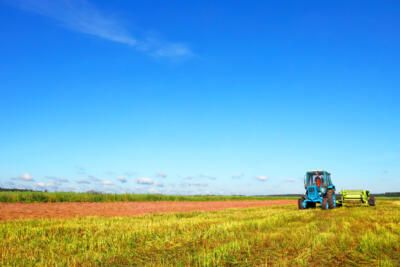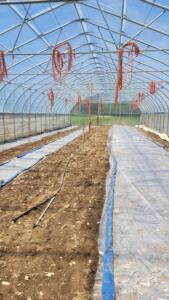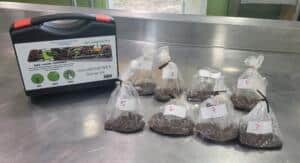By Gordon Merrick, OFRF’s Senior Policy & Programs Manager
Versión en español a continuación.
The Need that Technical Note 12 Meets
The Natural Resources Conservation Service of the United States Department of Agriculture (USDA-NRCS, NRCS) has been one of the most impactful modern agencies in the adoption of conservation practices and systems in the United States. Only recently did the NRCS publish a technical note that will aid Field Agents and other Technical Service Providers (TSPs) administer these programs on organic operations. Technical Note 12 – Conservation Activities in Organic Farming Systems (Tech Note 12) provides a wealth of knowledge needed to effectively support the unique requirements of organic producers. Recently, as part of our work for the Transition to Organic Partnership Program (TOPP) in the West/Southwest region, we have developed a toolkit designed to raise awareness among farmers of this resource, which is now in the hands of NRCS staff and TSPs. In this blog post, we’ll briefly discuss what Tech Note 12 is, how it benefits farmers, and how it helps NRCS staff and TSPs.
What Is Tech Note 12?
A technical note, as defined by the NRCS, is an authoritative document designed to provide detailed guidance on specific technical subjects relevant to conservation planning and implementation. These documents serve as essential resources for NRCS field staff, TSPs, and producers, offering in-depth information and practical instructions to support the effective management of natural resources and address resource concerns. Technical notes are developed to address a wide range of topics, including soil health, water quality, wildlife habitat, and agricultural practices. They offer step-by-step procedures, best management practices, and innovative solutions to common challenges faced in the field. By standardizing and disseminating this knowledge, technical notes help ensure consistency and quality in applying NRCS conservation programs and practices.
Tech Note 12 is intended to provide all this information—as it relates to organic agricultural production. It offers detailed guidance on conservation activities that are compatible with organic standards and provides real-world examples that illustrate how conservation activities have been implemented.
How Tech Note 12 Helps Farmers
Tech Note 12 helps organic producers articulate the conservation benefits of their practices in the language used by NRCS field agents and TSPs. This clarity is crucial for accessing NRCS programs such as the Environmental Quality Incentives Program (EQIP) and the Conservation Stewardship Program (CSP), which provide financial and technical assistance to improve farm operations.
How Tech Note 12 Helps NRCS Staff and TSPs
For NRCS field agents and TSPs, Technical Note 12 is an invaluable tool for conducting thorough assessments of organic farming operations. By referencing the document, agents can identify appropriate conservation practices that address resource concerns while complying with organic standards. This approach ensures that the proposed solutions are both effective and aligned with the unique traits of organic farming, such as soil fertility, water management, pest control, and habitat conservation.
How to Access and Use Tech Note 12
To effectively use Tech Note 12 for your organic farming practices, start by contacting your regional Natural Resource Conservation Service (NRCS) office. Your NRCS field agent can provide helpful guidance on applying the recommendations in Tech Note 12 to your conservation planning while meeting organic standards.
For additional information and resources, download our Tech Note 12 flyer here. The flyer includes a summary of Tech Note 12, practical tips for using it, and suggested questions to ask your NRCS agent. This will help you get the most out of your NRCS support and prepare for your discussion.
Don’t miss out on valuable resources like this one—subscribe to our newsletter for groundbreaking organic farming research, educational guides, and critical funding and policy updates.
¿Por qué es tan importante la Nota Técnica 12?
La Necesidad que Satisface la Nota Técnica 12
El Servicio de Conservación de Recursos Naturales del Departamento de Agricultura de los Estados Unidos (USDA-NRCS, NRCS) ha sido una de las agencias más influyentes en la adopción de prácticas y sistemas de conservación en Estados Unidos. Recientemente, el NRCS publicó una nota técnica que ayudará a los Agentes de Campo y otros Proveedores de Servicios Técnicos (TSP) a administrar estos programas en operaciones orgánicas. Nota Técnica 12 – Actividades de conservación en sistemas agrícolas orgánicos (Nota técnica 12) proporciona una gran cantidad de conocimientos necesarios para apoyar de manera efectiva los requisitos únicos de los productores orgánicos. Recientemente, como parte de nuestro trabajo para el Programa de Asociación para la Transición a la Agricultura Orgánica (TOPP) en la región Oeste/Suroeste, hemos desarrollado un kit de herramientas diseñado para concienciar a los agricultores sobre este recurso, que ahora está en manos del personal del NRCS y los TSP. En esta publicación del blog, discutiremos brevemente qué es la Nota Técnica 12, cómo beneficia a los agricultores y cómo ayuda al personal del NRCS y a los TSP.
¿Qué es la Nota Técnica 12?
Una nota técnica, según lo define el NRCS, es un documento autoritativo diseñado para proporcionar orientación detallada sobre temas técnicos específicos relevantes para la planificación e implementación de conservación. Estos documentos sirven como recursos esenciales para el personal de campo del NRCS, los TSP y productores, ofreciendo información detallada e instrucciones prácticas para apoyar la gestión efectiva de los recursos naturales y abordar las preocupaciones de recursos. Las notas técnicas se desarrollan para tratar una amplia gama de temas, incluyendo la salud del suelo, calidad del agua, hábitat de la vida silvestre y prácticas agrícolas. Ofrecen procedimientos paso a paso, mejores prácticas de gestión y soluciones innovadoras a desafíos comunes enfrentados en el campo. Al estandarizar y difundir este conocimiento, las notas técnicas ayudan a garantizar la consistencia y la calidad en la aplicación de los programas y prácticas de conservación del NRCS.
La Nota Técnica 12 está destinada a proporcionar toda esta información, en lo que respecta a la producción agrícola orgánica. Ofrece orientación detallada sobre las actividades de conservación que son compatibles con los estándares orgánicos y proporciona ejemplos reales que ilustran cómo se han implementado las actividades de conservación.
Como la Nota Técnica 12 ayuda a los agricultores
La Nota Técnica 12 ayuda a los productores orgánicos a articular los beneficios de conservación de sus prácticas en el lenguaje utilizado por los agentes de campo y los proveedores de servicios de conservación del NRCS. Esta claridad es crucial para acceder a programas del NRCS como el Programa de Incentivos a la Calidad Ambiental (EQIP) y el Programa de Administración de Conservación (CSP), que de asistencia financiera y técnica para mejorar las operaciones agrícolas.
¿Cómo Ayuda la Nota Técnica 12 al Personal del NRCS y a los TSP?
Para los agentes de campo del NRCS y los TSP, la Nota Técnica 12 es una herramienta invaluable para realizar evaluaciones exhaustivas de las operaciones de agricultura orgánica. Al consultar el documento, los agentes pueden identificar las prácticas de conservación apropiadas que aborden las preocupaciones de recursos mientras cumplen con los estándares orgánicos. Este enfoque asegura que las soluciones propuestas sean tanto efectivas como alineadas con las características únicas de la, (agricultura orgánica) tales como fertilidad del suelo, manejo del agua, control de plagas y conservación del hábitat.
Cómo Acceder y Utilizar la Nota Técnica 12
Para utilizar eficazmente la Nota Técnica 12 en sus prácticas de agricultura orgánica, comience contactando a su oficina regional del Servicio de Conservación de Recursos Naturales (NRCS) (Oficina del Servicio Regional de Conservación de Recursos Naturales (NRCS) Su agente de campo del NRCS puede ofrecerte orientación útil sobre cómo aplicar las recomendaciones de la Nota Técnica 12 en su planificación de conservación mientras cumple con los estándares orgánicos.
Para más información y recursos, descargue nuestro folleto sobre la Nota Técnica 12 aquí. El folleto incluye un resumen de la Nota Técnica 12, consejos prácticos para su uso y preguntas sugeridas para hacerle a su agente del NRCS. Esto le ayudará a aprovechar al máximo el apoyo del NRCS y prepararse para su conversación.
No se pierda recursos valiosos como este: (Suscríbase a nuestro boletín) para recibir investigaciones innovadoras en agricultura orgánica, guías educativas y actualizaciones importantes sobre financiamiento y políticas.










